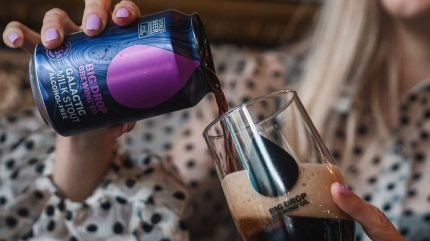
Tighter regulation around alcohol labelling would negatively impact alcoholic brands and their 0% abv products, according to specialist UK non-alcoholic brewer Big Drop.
Speaking at the International Beer and Cider Strategies conference in Prague last week, Big Drop CEO Rob Fink said he was confident “regulation and warnings on labels are coming” for alcoholic drinks, which could put pressure on sales of alcohol-free products.

Discover B2B Marketing That Performs
Combine business intelligence and editorial excellence to reach engaged professionals across 36 leading media platforms.
“What happens when you’re trying to sell a can of Corona, Guinness, Budweiser… Pilsner Urquell, and it’s in a brown paper wrapper with a big picture of a diseased liver. It’s quite hard to sell stuff with pictures like that,” Fink said at the event in the Czech capital.
He added: “Even if you can still market Guinness 0.0% as the non-alc beer of the premiership, if [the] Guinness alcoholic version is being sold in a brown paper wrapped can with a picture of a diseased liver on it, then good luck.”
In January, the US Surgeon General issued an advisory recommending that updates to alcoholic drinks labels to include warnings about the risks of cancer.
The document, titled Surgeon General’s Advisory on Alcohol and Cancer Risk, addressed the “direct link” between alcohol consumption and an increased risk of cancer.

US Tariffs are shifting - will you react or anticipate?
Don’t let policy changes catch you off guard. Stay proactive with real-time data and expert analysis.
By GlobalDataAccording to the advisory, alcohol is the “third leading preventable cause” of cancer in the US, after tobacco use and obesity.
“Now, whether or not we agree that that should be the case… This is the direction of travel,” added Fink. “It is very rare that things are deregulated. It’s very, very rare that markets have restrictions lifted on how they can sell, produce, market or advertise their products. This is the direction that we’re going in.”
Earlier this year, the World Health Organization called for “mandatory and standardised” health warning labels on alcoholic drinks in Europe to increase awareness of the links between alcohol consumption and cancer.
The organisation said a study conducted across 14 European countries found only 15% of people knew alcohol consumption was linked to breast cancer, while 39% were aware of its link to colon cancer.
At the time, WHO Europe regional director Dr Hans Henri Kluge said: “Clear and prominent health warning labels on alcohol, which include a specific cancer warning are a cornerstone of the right to health, because they empower individuals with vital information to make informed choices about the harm alcoholic products can cause.
“Providing this information does not take anything away from consumers, on the contrary, it arms them with knowledge, and knowledge is power.”
As of next year, Ireland will require alcoholic brands to include information that shows a clear connection between alcohol and fatal cancers. It will make the country the first worldwide to bring in such measures for alcoholic beverages.





